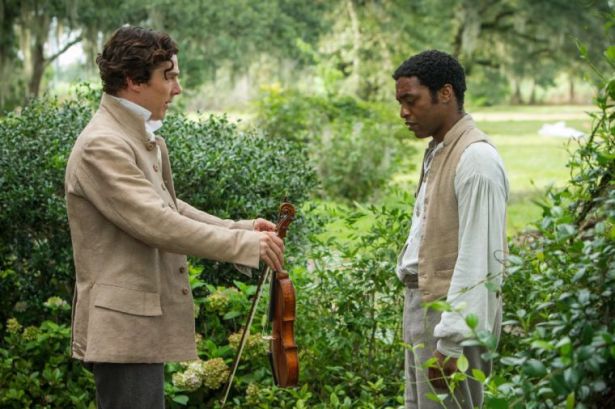Film critics weigh in on favorites in time for Oscars
PopMatters critics named “12 Years a Slave” the number one movie of 2013. Benedict Cumberbatch, left, plays “William Ford” and Chiwetel Ejiofor plays “Solomon Northup” in Steve McQueen’s hit film.
Just in time for the Academy Awards, critics from PopMatters international arts and culture magazine weigh in on their favorite films of 2013. While some are familiar Blockbuster hits, the others deserve to be acknowledged for their craftsmanship and content as well.
5. “Upstream Color”
Director: Shane Carruth
Whether you view it as an examination of suburban unease, a descent into madness or an analysis of chronic anxiety disorders, there’s no denying that “Upstream Color” is a masterpiece. Using pigs, hypnosis and “Walden” to invert the tropes of films like “Eternal Sunshine of the Spotless Mind” and “(500) Days of Summer,” Shane Carruth creates a world just to the left of our reality, where the sense of paranoia and fear is palpable, personified in the PTSD-afflicted Kris (Amy Seimetz). With his second feature, Carruth gives us all hope for not just the future of filmmaking, but for the unity and understanding of an undivided human race. The most human and humane work of cinematic art since “Children of Men.”
4. “The Wolf of Wall Street”
Director: Martin Scorsese
“The Wolf of Wall Street” is a choice change of pace for director Martin Scorsese, a narrative in which gore is replaced with gratuity and the nastiest tricks of the criminal trade are swapped for bare breasts and candles. The hits these men procure are made up of various recreational pharmaceuticals and the only regrets come at the point of a subpoena, not a competing family’s gun. It’s one of his funniest, most frenzied efforts, and at nearly three hours, it speeds by like a floor trader on amphetamines.
3. “Before Midnight”
Director: Richard Linklater
Across nearly two decades, “Before Sunrise,” “Before Sunset” and “Before Midnight” have observed a relationship in stages. Less scientific than Michael Apted’s “Up” series, but perhaps as insightful in their own ways, these films have always existed within a sort of fairy tale context of romantic possibility. What distinguishes this ongoing tale is its naturalistic use of time and space to reflect the changing circumstances of lives in progress. “Before Sunrise” was the free-wheeling, city-roaming night of youthful optimism that introduced audiences to Jesse (Ethan Hawke) and Celine (Julie Delpy). An audience invested in the series of films is likely shocked that familiarity has bred such contempt, but by putting the hard work of marriage on screen, screenplay writer and director Richard Linklater, Hawke and Delpy have also created an unforgettable scene of dramatic recognition.
2. “Gravity”
Director: Alfonso Cuaron
It’s been too long since a bona-fide master filmmaker like Alfonso Cuaron has been able to get Hollywood to cough up the dough for a big-budget, big-idea drama that can play all across the world to all kinds of people without insulting anybody’s intelligence or leaving others scratching their heads. After the already famous 17-minute single-take opening where astronauts Sandra Bullock and George Clooney are marooned after their space shuttle is crippled, Cuaron’s white-knuckler is one survival test after another. There’s big-tent showmanship here in spades, as well as well-honed storytelling and brilliant auteurish touches (those claustrophobic point-of-view shots from inside the astronauts’ helmets). It’s hard to ask for much more.
1. “12 Years a Slave”
Director: Steve McQueen
Thank goodness there’s British artist-turned-filmmaker Steve McQueen. After the stellar “Hunger” (about the Irish Republican Army and Bobby Sands) and “Shame” (a film fixated on another kind of ‘bondage’), the UK auteur has delivered the masterpiece known as “12 Years a Slave.” Based on the memoir by real life freeman-turned-indentured servant Solomon Northup and providing an unflinching portrayal of America’s cruel history, this is, without a doubt, the best film about race and slavery ever. It’s light years ahead of such spoon-fed pabulum as “The Help,” “The Butler” and “42.” About the closest anyone has come to this level of confrontation is Steven Spielberg with “Schindler’s List,” or even better, Spike Lee with his incendiary “Bamboozled.”









